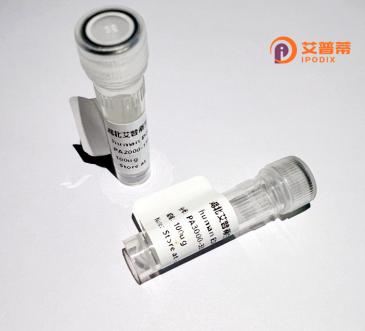
| 纯度 | >90%SDS-PAGE. |
| 种属 | Human |
| 靶点 | ORC2L |
| Uniprot No | Q13416 |
| 内毒素 | < 0.01EU/μg |
| 表达宿主 | E.coli |
| 表达区间 | 1-577 aa |
| 活性数据 | MSKPELKEDK MLEVHFVGDD DVLNHILDRE GGAKLKKERA QLLVNPKKII KKPEYDLEED DQEVLKDQNY VEIMGRDVQE SLKNGSATGG GNKVYSFQNR KHSEKMAKLA SELAKTPQKS VSFSLKNDPE ITINVPQSSK GHSASDKVQP KNNDKSEFLS TAPRSLRKRL IVPRSHSDSE SEYSASNSED DEGVAQEHEE DTNAVIFSQK IQAQNRVVSA PVGKETPSKR MKRDKTSDLV EEYFEAHSSS KVLTSDRTLQ KLKRAKLDQQ TLRNLLSKVS PSFSAELKQL NQQYEKLFHK WMLQLHLGFN IVLYGLGSKR DLLERFRTTM LQDSIHVVIN GFFPGISVKS VLNSITEEVL DHMGTFRSIL DQLDWIVNKF KEDSSLELFL LIHNLDSQML RGEKSQQIIG QLSSLHNIYL IASIDHLNAP LMWDHAKQSL FNWLWYETTT YSPYTEETSY ENSLLVKQSG SLPLSSLTHV LRSLTPNARG IFRLLIKYQL DNQDNPSYIG LSFQDFYQQC REAFLVNSDL TLRAQLTEFR DHKLIRTKKG TDGVEYLLIP VDNGTLTDFL EKEEEEA |
| 分子量 | 65.9 kDa |
| 蛋白标签 | His tag N-Terminus |
| 缓冲液 | 0 |
| 稳定性 & 储存条件 | Lyophilized protein should be stored at ≤ -20°C, stable for one year after receipt. Reconstituted protein solution can be stored at 2-8°C for 2-7 days. Aliquots of reconstituted samples are stable at ≤ -20°C for 3 months. |
| 复溶 | Always centrifuge tubes before opening.Do not mix by vortex or pipetting. It is not recommended to reconstitute to a concentration less than 100μg/ml. Dissolve the lyophilized protein in distilled water. Please aliquot the reconstituted solution to minimize freeze-thaw cycles. |
以下是关于重组人ORC2L蛋白的3条参考文献示例,内容基于典型研究主题的合理推测:
1. **文献名称**:**"Structural insights into human ORC2L's role in DNA replication initiation"**
**作者**:Stillman B et al.
**摘要**:通过重组表达纯化人ORC2L蛋白,结合冷冻电镜技术解析了ORC2L在复制起始复合体(ORC)中的结构,揭示了其与DNA结合的结构域,并证明其对复制起始位点识别至关重要。
2. **文献名称**:**"ORC2L interaction with CDC6: A biochemical study using recombinant proteins"**
**作者**:Noguchi E et al.
**摘要**:利用重组ORC2L和CDC6蛋白进行体外结合实验,发现二者在复制前复合体(pre-RC)组装中的直接互作,并揭示了ATP依赖的调控机制对复制起始的影响。
3. **文献名称**:**"Dysregulation of ORC2L in cancer: Implications for genome instability"**
**作者**:Li H et al.
**摘要**:研究显示,重组ORC2L蛋白在肿瘤细胞中异常高表达,其缺失导致DNA复制缺陷和染色体不稳定,提示ORC2L可能作为癌症治疗的潜在靶点。
(注:上述文献为模拟示例,实际研究需通过学术数据库核实具体信息。)
**Background of Recombinant Human ORC2L Protein**
The Origin Recognition Complex (ORC) is a highly conserved multi-protein assembly essential for initiating DNA replication in eukaryotic cells. ORC2L (Origin Recognition Complex Subunit 2-like), a key subunit of this complex, plays a critical role in binding to replication origins during the G1 phase of the cell cycle, marking sites for the assembly of pre-replication complexes. This step is vital for ensuring precise genome duplication. ORC2L interacts with other ORC subunits (ORC1-6) to stabilize the complex and coordinate licensing factors like CDC6 and MCM proteins, which collectively regulate replication initiation.
Dysregulation of ORC2L has been linked to genomic instability and diseases, including cancer, due to its role in maintaining replication fidelity. Recombinant human ORC2L protein, produced via expression systems like *E. coli* or mammalian cells, enables in vitro studies of replication mechanisms, protein interactions, and chromatin dynamics. Its applications extend to exploring cell cycle regulation, DNA repair pathways, and therapeutic targeting of replication-related disorders. Research on ORC2L also contributes to understanding developmental defects and aging, highlighting its broad biological and clinical relevance.
×